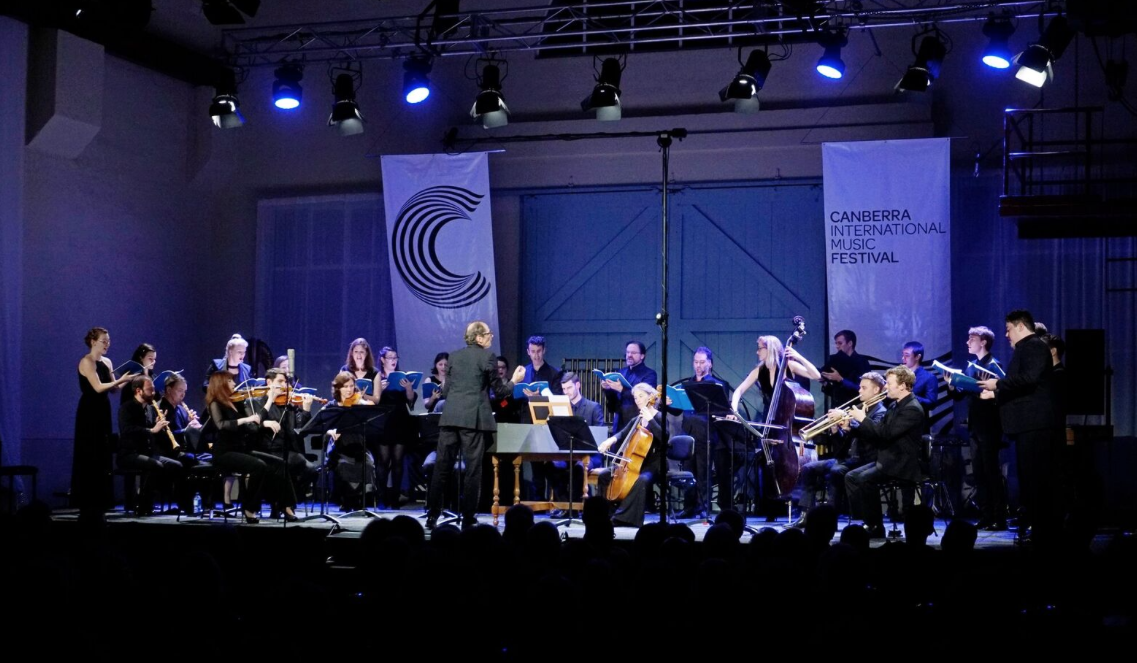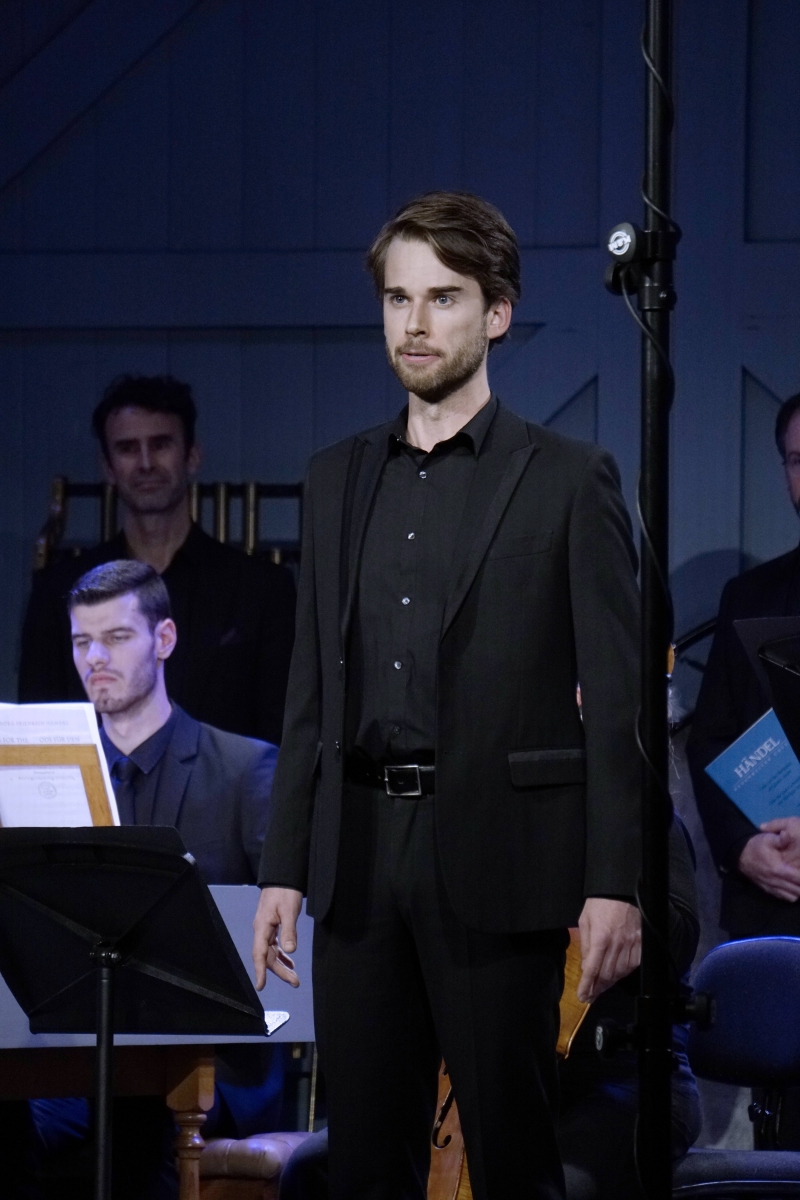Often the best festival programmes are those which provoke debate and disagreement. This was one such programme. On paper it looked a little odd: an all-Handel second half, a mix of other British music (including pieces by two Brit-Aust composers) in the first half. Underlying it all was a grand vision for world peace, perhaps somewhat less coherent in its execution than in its aspiration and design.
The concert opened with great promise: choristers processing down the centre aisle of the Fitters’ Workshop, pausing at various points to sing a verse by Thomas Tallis. The Tallis text – “Why fum’th in fight?” – hoisted a war-torn banner proclaiming the thesis of this extraordinary programme: perplexity and confusion at the age-old conundrum – why do the nations continue to rage so furiously together?
Moving onto the stage, the choristers embarked on an affecting piece by Andrew Ford, Waiting for the Barbarians, to a very conflict-driven text by CP Cavafy. Its multiple lines and inner voices were delivered with persuasive panache by the choristers and the new director of The Song Company, Antony Pitts. Almost every line started with a question: Why? What? “What is to become of us without barbarians?” Cavafy asks. “Those people were a solution of sorts.” (A similar question is raised by JP Coetzee in his 1980 novel Waiting for the Barbarians which was the basis of Philip Glass’s 2005 opera of the same name.)
 Why do the nations? at Canberra International Music Festival. Photo © Peter Hislop
Why do the nations? at Canberra International Music Festival. Photo © Peter Hislop
Florian Peelman was the soloist in Ford’s The Unquiet Grave, a 21-minute mini-concerto (1996) based on the old English ballad. He negotiated the deft moments of the work’s Britten-esque orchestration with grace, and his pianissimo whisperings at the work’s close almost managed to defeat the murmur of the hall’s air conditioning in a race to utter silence. The structure of the piece was elusive but intriguing, rather like a traveller setting out on a long journey without a map. Only at the work’s close was the destination revealed: there was a hint of folksong, often a signature touch of Ford whose recent 60th birthday was celebrated throughout this CIMF programme.
At first glance, the inclusion of Roger Smalley’s ‘birthday tango’ Footwork, a commission from Barbara Blackman for the 30th anniversary of the Australian Chamber Orchestra in 2005, was strange. Typical of the music of this late and much lamented composer-pianist, Footwork had not only some truly attractive Piazzolla-like moments but also a kind of New World energy and optimism. It was delivered with great flair by the strings. All the same, it seemed somewhat out of place in this programme. A more appropriate work might have been Smalley’s celebrated piece for 15 solo strings Strung Out (1987), where the players are placed in a line at the edge of the stage.
Then followed the Fantasia on a Theme by Thomas Tallis (1908) by Ralph Vaughan-Williams, its theme being the same heard at the outset of the concert, now over an hour earlier. By then, the connection may have been lost for some listeners. (A few years back, Richard Gill conducted RVW’s Fantasia with the Sydney Symphony, and a choir sang the Tallis original immediately beforehand, making the point of origin unequivocally clear.)
RVW laid out his score rather like the registration of a three-manual organ: a string quartet (the Choir), a small ensemble (the Swell) and the full ensemble (the Great). Ideally, those sources might be separated, to create the 3D effect in sound derived from the organ. That effect was not realized in this performance: the contrasts in registration were largely lost by concentration almost exclusively on the full body of strings.
 Bass-baritone Jeremy Kleeman at the Canberra International Music Festival
Bass-baritone Jeremy Kleeman at the Canberra International Music Festival
The concert shot to life at the very opening of the all-Handel second half. It was launched by a stirring rendition of the familiar aria from Messiah that was the moniker of this concert. The singer was an extraordinary young bass-baritone from Melbourne, Jeremy Kleeman whose dynamic rhythmic and melodic clarity, evenness of tone and assured presence delivered one of the truly great moments of this entire festival.
More Handel followed, the Birthday Ode for Queen Anne, HWV 74, sung by four impressive soloists, a choir of 22 singers (10 females and 12 males), and a Baroque orchestra, including pairs of oboes and trumpets. What a “grande and joyful noyse” did these people make, especially in that final chorus with its repeated (and pointed) reference to “a lasting peace on earth”. It was so ceremonial, hopefully triumphal and Olde Worlde England – all thrilling to hear.
The intricate web of connections in Roland Peelman’s programmes do not always reveal themselves immediately. Like the clues in a mystery novel, they come together slowly. They are too often lost by cumbersome stage movements and presentation. Yes, there is a small army of admirable young (volunteer?) stage management, and the stage of the otherwise wonderful Fitters’ Workshop is really too small for larger ensembles. There is often too much time between items. On other CIMF occasions, diverse stagings and even audience placements have been tried, for better or worse; more thought might be given to where forces are to be placed – where to place the three-layers of RVW strings, for instance? Moreover, the choristers might have sung the Tallis hymn from the rear of the hall.
Mindful of the shoestring budget of this festival – like the resources of too many others in this country – attention needs to be given to the presentation of events (lighting, props, even costuming, and so on). On another occasion, there was an entire half of French revolutionary music with nary a Tricoleur to be seen. As the CIMF presentation style becomes more efficient and sophisticated, the connective tissue of Peelman’s beautifully conceived programmes will be more apparent and successfully realized. The cumbersome staging of this concert impeded, perhaps even defeated its underlying tenet.
Like its elusive and furious theme, this was one of the more perplexing events of an otherwise splendid festival, inciting listeners to various points of view.











Comments
Log in to join the conversation.